#pro accounting software
Text
... is it bad that i've gone from never caring about what kind of plane i was going to be on but now feel the need to check if the airline i've been booked on has boeings
#personal#between that whole thing with the max planes built with murder software#and the doors coming off planes mid-flight#i'm just not feeling boeing right now#honestly i don't know if airbus is better#but i tell you what#i haven't seen a documentary about how it took two (2) brand new planes crashing for them to take accountability lately#so we'll put that tick in the 'pro airbus' column
15 notes
·
View notes
Text
Meta has engaged in a “systemic and global” censorship of pro-Palestinian content since the outbreak of the Israel-Gaza war on 7 October, according to a new report from Human Rights Watch (HRW).
In a scathing 51-page report, the organization documented and reviewed more than a thousand reported instances of Meta removing content and suspending or permanently banning accounts on Facebook and Instagram. The company exhibited “six key patterns of undue censorship” of content in support of Palestine and Palestinians, including the taking down of posts, stories and comments; disabling accounts; restricting users’ ability to interact with others’ posts; and “shadow banning”, where the visibility and reach of a person’s material is significantly reduced, according to HRW.
Examples it cites include content originating from more than 60 countries, mostly in English, and all in “peaceful support of Palestine, expressed in diverse ways”. Even HRW’s own posts seeking examples of online censorship were flagged as spam, the report said.
“Censorship of content related to Palestine on Instagram and Facebook is systemic and global [and] Meta’s inconsistent enforcement of its own policies led to the erroneous removal of content about Palestine,” the group said in the report, citing “erroneous implementation, overreliance on automated tools to moderate content, and undue government influence over content removals” as the roots of the problem.
[...]
Users of Meta’s products have documented what they say is technological bias in favor of pro-Israel content and against pro-Palestinian posts. Instagram’s translation software replaced “Palestinian” followed by the Arabic phrase “Praise be to Allah” to “Palestinian terrorists” in English. WhatsApp’s AI, when asked to generate images of Palestinian boys and girls, created cartoon children with guns, whereas its images Israeli children did not include firearms.
5K notes
·
View notes
Text
Great Big Good Omens Graphic Novel Update
AKA A Visit From Bildad the Shuhite.
The past year or so has been one long visit from this guy, whereupon he smiteth my goats and burneth my crops, woe unto the woeful cartoonist.
Gaze upon the horror of Bildad the Shuhite.

You kind of have to be a Good Omens fan to get this joke, but trust me, it's hilarious.
Anyway, as a long time Good Omens novel fan, you may imagine how thrilled I was to get picked to adapt the graphic novel.
Go me!
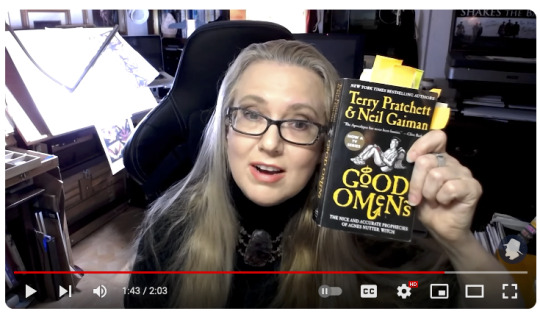
This is quite a task, I have to say, especially since I was originally going to just draw (and color) it, but I ended up writing the adaptation as well. Tricky to fit a 400 page novel into a 160-ish page graphic novel, especially when so much of the humor is dependent on the language, and not necessarily on the visuals.
Not complainin', just sayin'.
Anyway, I started out the gate like a herd of turtles, because right away I got COVID which knocked me on my butt.
And COVID brain fog? That's a thing. I already struggle with brain fog due to autoimmune disease, and COVID made it worse.
Not complainin' just sayin'.
This set a few of the assignments on my plate back, which pushed starting Good Omens back.
But hey, big fat lead time! No worries!
Then my computer crawled toward the grave.
My trusty MAC Pro Tower was nearly 15 years old when its sturdy heart ground to a near-halt with daily crashes. I finally got around to doing some diagnostics; some of its little brain actions were at 5% functionality. I had no reliable backups.
There are so many issues with getting a new computer when you haven't had a new computer or peripherals in nearly fifteen years and all of your software, including your Photoshop program is fifteen years old.
At the time, I was still on rural internet...which means dial-up speed.
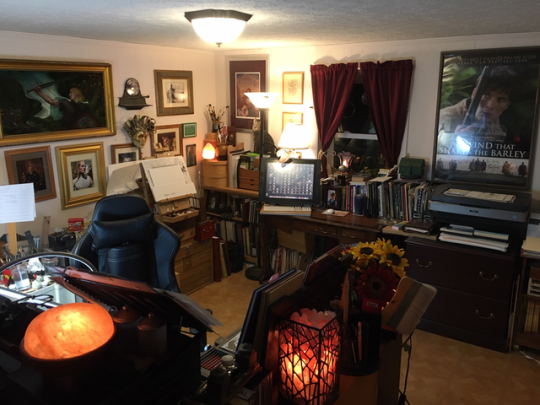
Whatever you have for internet in the city, roll that clock back to about 2001.
That's what I had. I not only had to replace almost all of my hardware but I had to load and update all programs at dial-up speed.
Welcome to my gigabyte hell.
The entire process of replacing the equipment and programs took weeks and then I had to relearn all the software.
All of this was super expensive in terms of money and time cost.
But I was not daunted! Nosirree!
I still had a huge lead time! I can do anything! I have an iron will!
And boy, howdy, I was going to need it.
At about the same time, a big fatcat quadrillionaire client who had hired me years ago to develop a big, major transmedia project for which I was paid almost entirely in stock, went bankrupt leaving everyone holding the bag, and taking a huge chunk of my future retirement fund with it.
I wrote a very snarky almost hilarious Patreon post about it, but am not entirely in a position to speak freely because I don't want to get sued. Even though I had to go to court over it, (and I had to do that over Zoom at dial-up speed,) I'm pretty sure I'll never get anything out of this drama, and neither will anyone else involved, except millionaire dude and his buddies who all walked away with huge multi-million dollar bonuses weeks before they declared bankruptcy, all the while claiming they would not declare bankruptcy.
Even the accountant got $250,000 a month to shut down the business, while creators got nothing.
That in itself was enough drama for the year, but we were only at February by that point, and with all those months left, 2023 had a lot more to throw at me.
Fresh from my return from my Society of Illustrators show, and a lovely time at MOCCA, it was time to face practical medical issues, health updates, screening, and the like. I did my adult duty and then went back to work hoping for no news, but still had a weird feeling there would be news.
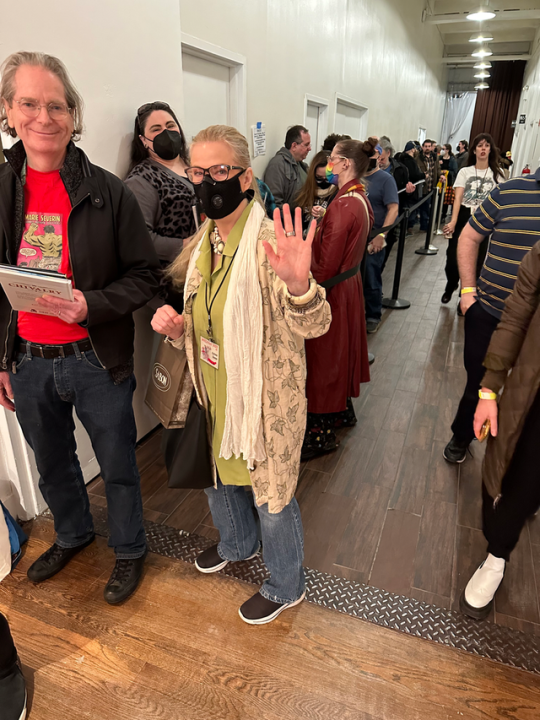
I know everyone says that, but I mean it. I had a bad feeling.
Then there was news.
I was called back for tests and more tests. This took weeks. The ubiquitous biopsy looked, even to me staring at the screen in real time, like bad news.
It also hurt like a mofo after the anesthesia wore off. I wasn't expecting that.
Then I got the official bad news.
Cancer which runs in my family finally got me. Frankly, I was surprised I didn't get it sooner.
Stage 0, and treatment would likely be fast and complication-free. Face the peril, get it over with, and get back to work.
I requested surgery months in the future so I could finish Good Omens first, but my doc convinced me the risk of waiting was too great. Get it done now.
"You're really healthy," my doc said. Despite an auto-immune issue which plagues me, I am way healthier than the average schmoe of late middle age. She informed me I would not even need any chemo or radiation if I took care of this now.

So I canceled my appearance at San Diego Comic Con. I did not inform the Good Omens team of my issues right away, thinking this would not interfere with my work schedule, but I did contact my agent to inform her of the issue. I also contacted a lawyer to rewrite my will and make sure the team had access to my digital files in case there were complications.
Then I got back to work, and hoped for the best.
Eff this guy.

Before I could even plant my carcass on the surgery table, I got a massive case of ocular shingles.
I didn't even know there was such a thing.
There I was, minding my own business. I go to bed one night with a scratchy eye, and by 4 PM the next day, I was in the emergency room being told if I didn't get immediate specialist treatment, I was in big trouble.
I got transferred to another hospital and got all the scary details, with the extra horrid news that I could not possibly have cancer surgery until I was free of shingles, and if I did not follow a rather brutal treatment procedure - which meant super-painful eye drops every half hour, twenty-four hours a day and daily hospital treatment - I could lose the eye entirely, or be blinded, or best case scenario, get permanent eye damage.
What was even funnier (yeah, hilarity) is the drops are so toxic if you don't use the medication just right, you can go blind anyway.
Hi Ho.
Ulcer is on the right. That big green blob.
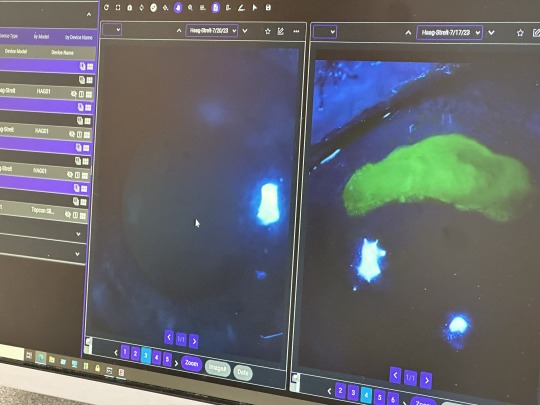
I had just finished telling my cancer surgeon I did not even really care about getting cancer, was happy it was just stage zero, had no issues with scarring, wanted no reconstruction, all I cared about was my work.
Just cut it out and get me back to work.
And now I wondered if I was going to lose my ability to work anyway.
Shingles often accompanies cancer because of the stress on the immune system, and yeah, it's not pretty. This is me looking like all heck after I started to get better.

The first couple of weeks were pretty demoralizing as I expected a straight trajectory to wellness. But it was up and down all the way.
Some days I could not see out of either eye at all. The swelling was so bad that I had to reach around to my good eye to prop the lid open. Light sensitivity made seeing out of either eye almost impossible. Outdoors, even with sunglasses, I had to be led around by the hand.
I had an amazing doctor. I meticulously followed his instructions, and I think he was surprised I did. The treatment is really difficult, and if you don't do it just right no matter how painful it gets, you will be sorry.
To my amazement, after about a month, my doctor informed me I had no vision loss in the eye at all. "This never happens," he said.
I'd spent a couple of weeks there trying to learn to draw in the near-dark with one eye, and in the end, I got all my sight back.
I could no longer wear contact lenses (I don't really wear them anyway, unless I'm going to the movies,) would need hard core sun protection for awhile, and the neuralgia and sun sensitivity were likely to linger. But I could get back to work.
I have never been more grateful in my life.
Neuralgia sucks, by the way, I'm still dealing with it months later.
Anyway, I decided to finally go ahead and tell the Good Omens team what was going on, especially since this was all happening around the time the Kickstarter was gearing up.
Now that I was sure I'd passed the eye peril, and my surgery for Stage 0 was going to be no big deal, I figured all was a go. I was still pretty uncomfortable and weak, and my ideal deadline was blown, but with the book not coming out for more than a year, all would be OK. I quit a bunch of jobs I had lined up to start after Good Omens, since the project was going to run far longer than I'd planned.
Everybody on the team was super-nice, and I was pretty optimistic at this time. But work was going pretty slow during, as you may imagine.
But again...lots of lead time still left, go me.
Then I finally got my surgery.
Which was not as happy an experience as I had been hoping for.
My family said the doc came out of the operating room looking like she'd been pulled backwards through a pipe, She informed them the tumor which looked tiny on the scan was "...huge and her insides are a mess."
Which was super not fun news.
Eff this guy.

The tumor was hiding behind some dense tissue and cysts. After more tests, it was determined I'd need another surgery and was going to have to get further treatments after all.
The biopsy had been really painful, but the discomfort was gone after about a week, so no biggee. The second surgery was, weirdly, not as painful as the biopsy, but the fatigue was big time.
By then, the Good Omens Kickstarter had about run its course, and the record-breaker was both gratifying and a source of immense social pressure.
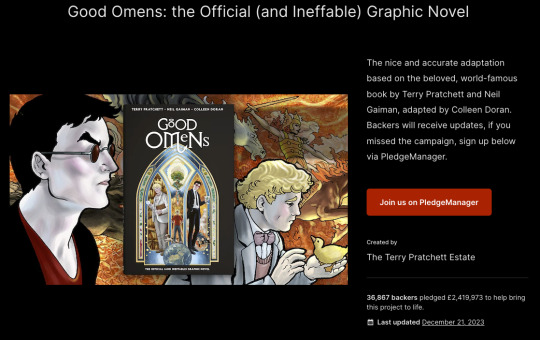
I'd already turned most of my social media over to an assistant, and I'm glad I did.
But the next surgery was what really kicked me on my keister.
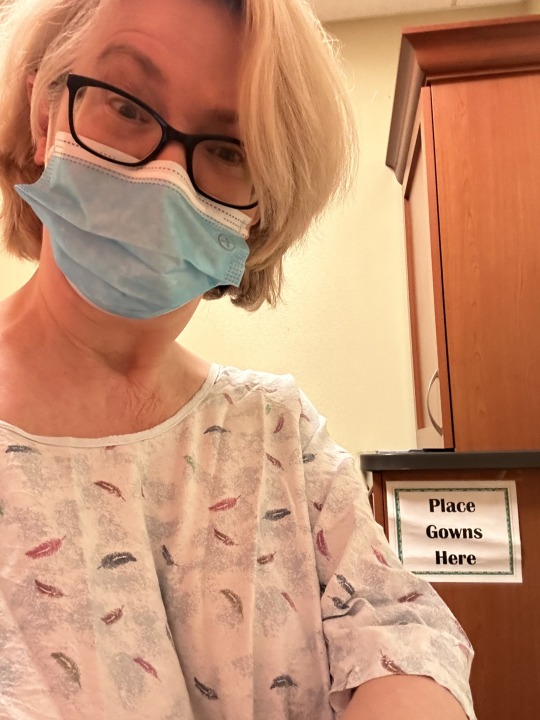
All in all, they took out an area the size of a baseball. It was hard to move and wiped me out for weeks and weeks. I could not take care of myself. I'd begun losing hair by this time anyway, and finally just lopped it off since it was too heavy for me to care for myself. The cut hides the bald spots pretty well.
After about a month, I got the go-ahead to travel to my show at the San Diego Comic Con Museum (which is running until the first week of April, BTW). I was very happy I had enough energy to do it. But as soon as I got back, I had to return to treatment.
Since I live way out in the country, going into the city to various hospitals and pharmacies was a real challenge. I made more than 100 trips last year, and a drive to the compounding pharmacy which produced the specialist eye medicine I could not get anywhere else was six hours alone.
Naturally, I wasn't getting anything done during this time.
But at least my main hospital is super swank.


The oncology treatment went smoothly, until it didn't. The feels don't hit you until the end. By then I was flattened.
So flattened that I was too weak to control myself, fell over, and smashed my face into some equipment.

Nearly tore off my damn nostril.
Eff this guy.

Anyway, it was a bad year.
Here's what went right.
I have a good health insurance policy. The final tally on my health care costs ended up being about $150,000. I paid about 18% of that, including insurance. I had a high deductible and some experimental medicine insurance didn't cover. I had savings, enough to cover the months I wasn't working, and my Patreon is also very supportive. So you didn't see me running a Gofundme or anything.
Thanks to everyone who ever bought one of my books.
No, none of that money was Good Omens Kickstarter money. I won't get most of my pay on that for months, which is just as well because it kept my taxes lower last year when I needed a break.
So, yay.
My nose is nearly healed. I opted out of plastic surgery, and it just sealed up by itself. I'll never be ready for my closeup, but who the hell cares.
I got to ring the bell.
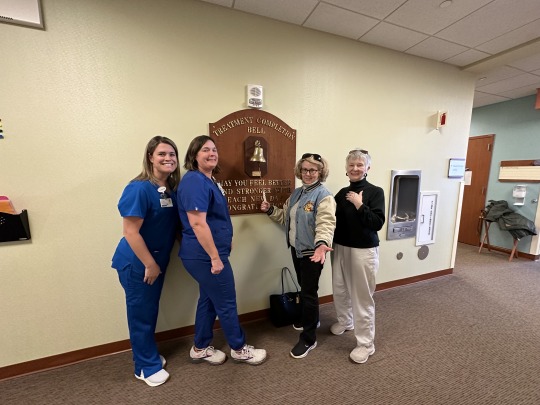
I had a very, VERY hard time getting back to work, especially with regard to focus and concentration. My work hours dropped by over 2/3. I was so fractured and weak, time kept slipping away while I sat in the studio like a zombie. Most of the last six months were a wash.
I assumed focus issues were due (in part) to stress, so sought counseling. This seemed like a good idea at first, but when the counselor asked me to detail my issues with anxiety, I spent two weeks doing just that and getting way more anxious, which was not helpful.
After that I went EFF THIS NOISE, I want practical tools, not touchy feelies (no judgment on people who need touchy-feelies, I need a pragmatic solution and I need it now,) so tried using the body doubling focus group technique for concentration and deep work.
Within two weeks, I returned to normal work hours.
I got rural broadband, jumping me from dial up speed to 1 GB per second.
It's a miracle.

Massive doses of Vitamin D3 and K2. Yay.
The new computer works great.
The Kickstarter did so well, we got to expand the graphic novel to 200 pages. Double yay.
I'm running late, but everyone on the Good Omens team is super supportive. I don't know if I am going to make the book late or not, but if I do, well, it surely wasn't on purpose, and it won't be super late anyway. I still have months of lead time left.
I used to be something of a social media addict, but now I hardly ever even look at it, haven't been directly on some sites in over a year, and no longer miss it. It used to seem important and now doesn't.
More time for real life.
While I think the last year aged me about twenty years, I actually like me better with short hair. I'm keeping it.

OK. Rough year.
Not complainin', just sayin'.
Back to work on The Book.
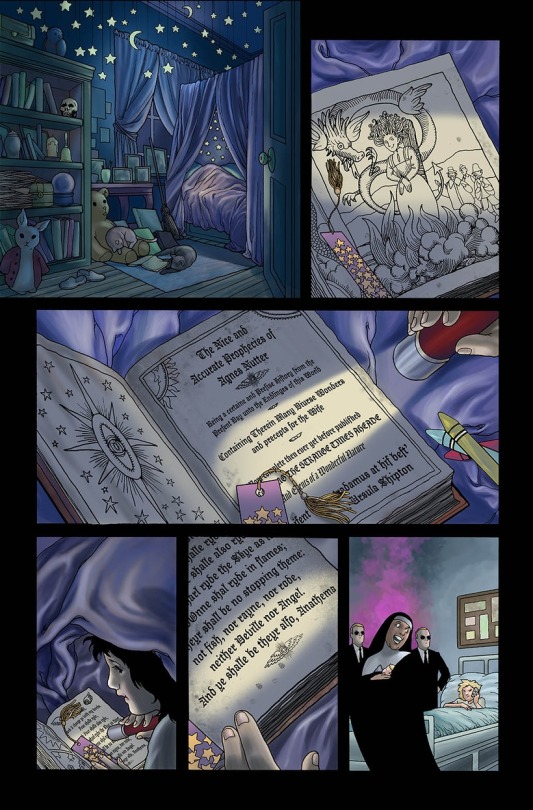
And only a day left to vote for Good Omens, Neil Gaiman, and Sandman in the Comicscene Awards. Thanks.
2K notes
·
View notes
Text
Business Growth Guide - Avoid these challenges to maximize your revenue

It's no small task to move your company up the ladder, but the payoff is worth it. When your small business enters the growth phase, you open up a world of new opportunities. By this time, people are usually familiar with your brand, and you have a solid customer base.
Companies can take advantage of the situation by identifying institutional gaps in the market and see how they can be filled. There are a few ways that businesses can grow. They can target new market segments that they weren't able to before, expand their production facilities to accommodate more business, or improve the quality of their finished products to attract new customers. Additionally, by using market research and data analysis, businesses can identify opportunities for growth and expansion.
The growth phase for a small business can be a real challenge. You need to make a profit, but there are all sorts of other obstacles in your way like managing your accounts, bookkeeping and data analysis; use of advanced technology accounting QuickBooks pro hosting can help you take on these challenges and overcome them.
Some of the challenges that small businesses face during their growth phase include:
Responding to competition
We live in a marketplace that's constantly evolving and where customers have more choices than ever before. It can be hard to stand out when there are so many people offering similar products and services, but that's where innovation comes in. When you enter the market with a new idea, it might not be long before someone copies it, but that doesn't mean you shouldn't keep pushing boundaries and breaking new ground.
When you reach the growth phase, you'll find that not only are customers more interested in what you're selling, but potential competitors are as well. This is because other sellers become aware of your success and start taking steps to try and get a piece of your market share. However, there are a few things you can do to stay ahead of the competition.
As a small business owner, you always need to be on the lookout for new competitors. If you're not prepared, they could quickly take away your market share. To avoid this, make sure you have a clear and compelling unique selling proposition. This will help you stand out against the competition and attract customers.
Price wars are never a good idea for small businesses. When companies race to have the lower price than their competitor, it often ends up backfiring and causing them to lose revenue. Instead of getting caught up in price, focus on the quality of your service. This is what will really set your business apart from others in the long run.
Keeping up the changes of market
Things will not go your way when you have a narrow view of your business and don't keep up with changes. Market changes can occur in many areas, not just technology. Businesses should be prepared for all kinds of changes, from lifestyle and spending patterns to preferences.
Even if your business is doing well, you can't stop research and surveying. This is the best way to stay ahead of changes in the market. If you don't have the resources to pay a research agency, you can still do it on your own. All you need to do is choose a relevant sample and conduct some focused group discussions.
It's important for product managers to understand their audience. The best way to do this is to see what they like and don't like. Another great way to learn about your audience is by observing their buying behavior in supermarkets.
Managing the accounting data
When your profitability ratios improve, you'll see a corresponding increase in numerical figures. That's good news because it means you're making profits. But it can also be a challenge, because there is more accounting data to manage.
When your business starts to grow, you'll inevitably have to deal with more customers and more invoices. This can mean more accounting processes and more complicated financial statements. In order to keep everything organized, you might feel the need to hire more accountants.
There's good news for small business owners who feel like they're constantly bogged down by accounting duties: Accounting software’s can help! They are an ideal accounting solution for small businesses that are in the introduction or growth phase. Accounting software like QuickBooks pro cloud hosting allows you to track your expenses, record transactions, and generate important financial reports within a few minutes. This way, you can avoid the hassle and spend your time on more important tasks.
You can always upgrade to a more advanced version, and get industry-specific accounting software that caters to your business. This way, you'll always be ahead of the curve and able to better serve your clients.
#smallbusiness#accounting software#data security#remote desktop#business finance#QuickBooks pro hosting#QuickBooks pro cloud hosting
0 notes
Text
Barbara Gordon's Coding & Computer Cram School is a popular YouTube series. Tucker Foley is a star student.
Barbara Gordon's Cram School posts free online courses for both coding and computer engineering. Think Crash Course in terms of entertainment, but college lecture in terms of depth. Hundreds of thousands of viewers flock to it— students who missed a class, people looking to add new skills to a resume, even simple hobbyists. It’s a project Barbara’s proud of.
Sometimes, when she wants to relax, she’ll even hop in the comments and spend an afternoon troubleshooting a viewer’s project with them.
User “Fryer-Tuck” has especially interesting ones. Barbara finds herself seeking out his comments, checking in on whatever this crazy kid is making next. An app for collecting GPS pings and assembling them on a map in real-time, an algorithm that connects geographic points to predict something’s movement taking a hundred other variables into account, simplified versions of incredibly complex homemade programs so they can run on incredibly limited CPU’s.
(Barbara wants to buy the kid a PC. It seems he’s got natural talent, but he keeps making reference to a PDA. Talk about 90’s! This guy’s hardware probably predates his birth.)
She chats with him more and more, switching to less public PM threads, and eventually, he opens up. His latest project, though, is not something Barbara has personal experience with.
FT: so if you found, hypothetically, a mysterious glowing substance that affects tech in weird and wacky ways that could totally have potential but might be vaguely sentient/otherworldly…. what would you do and how would you experiment with it. safely, of course. and hypothetically
BG: I’d make sure all my tests were in disposable devices and quarantined programs to keep it from infecting my important stuff. Dare I ask… how weird and wacky is it?
FT: uhhh. theoretically, a person composed of this substance once used it to enter a video game. like physical body, into the computer, onto the screen? moving around and talking and fighting enemies within the game?
FT: its been experimented with before, but not on any tech with a brain. just basic shields and blasters and stuff, its an energy source. also was put in a car once
FT: i wanna see how it affects software, yk? bc i already know it can. mess around and see how far i can push it
BG: […]
FT: … barbara?
BG: Sorry, thinking. Would you mind sharing more details? You said “blasters?”
Honestly. Kid genius with access to some truly wacky materials and even wackier weapons, she needs to start a file on him before he full sends to either hero or villain.
[OR: Tucker is a self-taught hacker, but if he were to credit a teacher, he'd name Barbara Gordon's Coding & Computer Cram School! He's even caught the attention of Dr. Gordon herself. She's full of sage advice, and with how she preaches the value of a good VPN, he's sure she's not pro-government. Maybe she'll help him as he studies the many applications of ecto-tech!]
#she does end up sending tucker a PC lol#and after she learns he has experience supporting a superhero team maybe pushes his name forward to WEs outreach program for r&d potentials#picks him up by the scruff and says MY coding buddy#also fun fact she had a phd in library science at one point. i like that about her i think we should talk about it a little more#also tucker was making a ghost reporting & tracking app for amity parkers#dpxdc#dcxdp#barbara gordon#tucker foley#prompt#kipwrite
557 notes
·
View notes
Text
heres a few links from my bookmarks folder full of HTML and CSS resources that i used when first making my neocities website because i want other people to make their own sites as well because its fun :)
how to actually do html and css
web design in 4 minutes - this is the site that really made HTML and CSS click for me, following along as the author describes what’s he’s doing to the webpage and showing how it changes the presentation (you don’t need the book he shills at the end. i did without)
w3schools introduction to html - takes you through the very basics of creating a website, lesson-by-lesson. big goldmine for code to grab and scaffold off of once you have some basic skills
mozilla’s html guide - also a great beginner’s guide by the people who made mozilla, although i didnt use it as much as w3 schools
brackets.io - this is the program i use to write the files i use for my website. lets you do splitscreen to work with two files at once, gives you a breakdown of all the files in your website’s folder, and will let you autofill commonly-used tags and files in the code. supposedly has a live preview function but it doesnt work that well for me when i’m using a second monitor, which i normally do when coding. just save the file and refresh the page instead.
(side note: i work in a software external to neocities instead of directly in the neocities editor because 1. local files update with a refresh and neocities has to update the cookies AND download all the website info again once you update, and 2. it effectively gives you a mass undo button if you fuck up because you have your files hosted in multiple places (local and online). yes its kinda annoying to have to manually upload all my files especially bc you cant upload whole folders AND you cant move their locations once uploaded but i prefer it to working directly on the site. if you have a neocities pro subscription ($5/month) you can mount your website directly on your machine as opposed to the neocities dashboard, which basically means you dont have to manually upload the code every time you change something -- it’ll update automatically)
codepen - if you prefer something browser-based to work in then try codepen, i used it a little bit at the beginning when trying to troubleshoot some code i didn’t quite understand. you need an account to actually save your work and im not sure if it actually lets you upload folders bc i never signed up lol
premade engines/sites/themes/etc etc
neothemes or eggramen or templaterr - if you wanna get a quick start on a neocities site, you CAN use a theme generator/premade theme. if you go this route i would still heavily recommend trying to learn HTML and CSS, and then go into the guts of your own website to try and pick it apart and change it to your liking
zonelets - a static blogging engine that uses HTML, CSS, and javascript. made for use on neocities but theoretically useable elsewhere. takes about 15 minutes to set up (if you use a default theme, but its pretty customizable if you know what you’re doing) and requires you to 1. write blog posts in html and 2. modify some code in a script file every time you want to upload a post, but it will automatically let you browse posts in order once you get everything uploaded
rarebit - a neocities webcomic template — havent used it yet but looks cool, and seems to operate off of the same principles as zonelets.
glightbox - this is the lightbox javascript code i use when i want to display a lot of images on one page. i found this code via clicking “inspect element” on a neocities fanpage that the webmaster drew a lot of fanart for. you should click inspect element on neocities pages that you like so you can understand how they do what you like (you can even look at their css by clicking the style.css link you have to include at the top of your page)
plus a couple masterlists/directories:
yesterlinks
sadgrl.online’s webmastery directory
#unidentified gay noise#html#neocities#i took a 2.5 hour nap today and drank coffee at 4 pm and im still sleept#edit oct 22: removed the anti-t*rf disclaimer bc i havent seen any sus reblogs in a while and i didnt wanna keep seeing it in my notifs#but it still stands :)
6K notes
·
View notes
Text
I went digging through youtube, old posts, and shitty websites, along with my memories, and here you go! Hopefully these are accurate.
2013 — Unoffical Tumblr event “Mishapocalypse” happened, an online flash mob event wherein which Tumblrinas change their profile pictures to a specific picture of Misha Collins of Supernatural fame.
2014 — Users were given the option to get Tumblr Pro for free, and those who accepted were given top hats on their icons. Prompty after this, @staff announced that “Everyone with a top hat is now marked for account deletion. This is the only way we could destroy this horrible website. Happy April Fools day.”
2015 — The “Executive Suite 2016 Productivity Edition” essentially changed Tumblr into office software, allowing spreadsheets for memes, calculators that gave incorrect answers, and Coppy. Who gave “helpful tips”.
2016 — Tumblr voted to select the “new lizard king”, from Rick, Debrah, Mop and Wretched Tooth. However, more famously, an edited @staff post reads “for april fools we’re deleting this entire site sayonara you weeaboo shits”.
2017 — The Tumblr Horse Game was a feature that, when clicked, took users to a game wherein you had to collect shit from a pixelated horse. If you failed to do so, the horse died.
2018 — The answer to Bitcoin, is Tumblcoin! A parody of crytocurency.
2019 — Tumblr Memories, in which Tumbeasts were set loose. Remember them? The mascot from 2011, for service interruption announcements.
2020 — There was seemingly no prank this year. This was COVID-19.
2021 — Tumblr released “non-fungible tumblcryptids”, a parody of NFTs. There was a supposedly limited amount of them.
2022 — A light switch, when activated, would open up a variety of colourful things on the desktop dashboard, including a “Summon Crab!” button, which would summon a crab when activated. Other buttons made different sounds.
2023 — A feature similar to the Discord reaction function was temporarily added, using basic emojis.
2024 — Every user was given the option to opt-in to the boop o meter, and could boop, super boop, and evil boop other users who also opted in, earning up to three badges by doing so.
#april fools#tumblr meta#boop o meter#tumblr memories#tumbeasts#non fungible tumblcryptids#summmon crab#tumblcoin#coppy#tumblr horse game#tumblr pro#mishapocalypse#new lizard king#boop
57 notes
·
View notes
Text
The long sleep of capitalism’s watchdogs

There are only five more days left in my Kickstarter for the audiobook of The Bezzle, the sequel to Red Team Blues, narrated by @wilwheaton! You can pre-order the audiobook and ebook, DRM free, as well as the hardcover, signed or unsigned. There's also bundles with Red Team Blues in ebook, audio or paperback.

One of the weirdest aspect of end-stage capitalism is the collapse of auditing, the lynchpin of investing. Auditors – independent professionals who sign off on a company's finances – are the only way that investors can be sure they're not handing their money over to failing businesses run by crooks.
It's just not feasible for investors to talk to supply-chain partners and retailers and verify that a company's orders and costs are real. Investors can't walk into a company's bank and demand to see their account histories. Auditors – who are paid by companies, but work for themselves – are how investors avoid shoveling money into Ponzi-pits.
Attentive readers will have noticed that there is an intrinsic tension in an arrangement where someone is paid by a company to certify its honesty. The company gets to decide who its auditors are, and those auditors are dependent on the company for future business. To manage this conflict of interest, auditors swear fealty to a professional code of ethics, and are themselves overseen by professional boards with the power to issue fines and ban cheaters.
Enter monopolization. Over the past 40 years, the US government conducted a failed experiment in allowing companies to form monopolies on the theory that these would be "efficient." From Boeing to Facebook, Cigna to InBev, Warner to Microsoft, it has been a catastrophe. The American corporate landscape is dominated by vast, crumbling, ghastly companies whose bad products and worse corporate conduct are locked in a race to see who can attain the most depraved enshittification quickest.
The accounting profession is no exception. A decades-long incestuous orgy of mergers and acquisitions yielded up an accounting sector dominated by just four firms: EY, KPMG, PWC and Deloitte (the last holdout from the alphabetsoupification of corporate identity). Virtually every major company relies on one of these companies for auditing, but that's only a small part of corporate America's relationship with these tottering behemoths. The real action comes from "consulting."
Each of the Big Four accounting firms is also a corporate consultancy. Some of those consulting services are the normal work of corporate consultants – cookie cutter advice to fire workers and reduce product quality, as well as supplying dangerously defecting enterprise software. But you can get that from the overpaid enablers at McKinsey or BCG. The advantage of contracting with a Big Four accounting firm for consulting is that they can help you commit finance fraud.
Remember: if you're an executive greenlighting fraud, you mostly just want to be sure it's not discovered until after you've pocketed your bonus and moved on. After all, the pro-monopoly experiment was also an experiment in tolerating corporate crime. Executives who cheat their investors, workers and suppliers typically generate fines for their companies, while escaping any personal liability.
By buying your cheating advice from the same company that is paid to certify that you're not cheating, you greatly improve your chances of avoiding detection until you've blown town.
Which brings me to the idea of the "bezzle." This is John Kenneth Galbraith's term for "the weeks, months, or years that elapse between the commission of the crime and its discovery." This is the period in which both the criminal and the victim feel like they're better off. The crook has the victim's money, and the victim doesn't know it. The Bezzle is that interval when you're still assuming that FTX isn't lying to you about the crazy returns they're generating for your crypto. It's the period between you getting the shrinkwrapped box with a 90% discounted PS5 in it from a guy in an alley, and getting home and discovering that it's full of bricks and styrofoam.
Big Accounting is a factory for producing bezzles at scale. The game is rigged, and they are the riggers. When banks fail and need a public bailout, chances are those banks were recently certified as healthy by one of the Big Four, whose audited bank financials failed 800 re-audits between 2009-17:
https://pluralistic.net/2020/09/28/cyberwar-tactics/#aligned-incentives
The Big Four dispute this, of course. They claim to be models of probity, adhering to the strictest possible ethical standards. This would be a lot easier to believe if KPMG hadn't been caught bribing its regulators to help its staff cheat on ethics exams:
https://www.nysscpa.org/news/publications/the-trusted-professional/article/sec-probe-finds-kpmg-auditors-cheating-on-training-exams-061819
Likewise, it would be easier to believe if their consulting arms didn't keep getting caught advising their clients on how to cheat their auditing arms:
https://pluralistic.net/2023/05/09/dingo-babysitter/#maybe-the-dingos-ate-your-nan
Big Accounting is a very weird phenomenon, even by the standards of End-Stage Capitalism. It's an organized system of millionaire-on-billionaire violence, a rare instance of the very richest people getting scammed the hardest:
https://pluralistic.net/2021/06/04/aaronsw/#crooked-ref
The collapse of accounting is such an ominous and fractally weird phenomenon, it inspired me to write a series of hard-boiled forensic accountancy novels about a two-fisted auditor named Martin Hench, starting with last year's Red Team Blues (out in paperback next week!):
https://us.macmillan.com/books/9781250865854/redteamblues
The sequel to Red Team Blues is called (what else?) The Bezzle, and part of its ice-cold revenge plot involves a disillusioned EY auditor who can't bear to be part of the scam any longer:
https://www.kickstarter.com/projects/doctorow/the-bezzle-a-martin-hench-audiobook-amazon-wont-sell
The Hench stories span a 40-year period, and are a chronicle of decades of corporate decay. Accountancy is the perfect lens for understanding our modern fraud economy. After all, it was crooked accountants who gave us the S&L crisis:
https://scholarworks.umt.edu/cgi/viewcontent.cgi?article=10130&context=etd
Crooked auditors were at the center of the Great Financial Crisis, too:
https://francinemckenna.com/2009/12/07/they-werent-there-auditors-and-the-financial-crisis/
And of course, crooked auditors were behind the Enron fraud, a rare instance in which a fraud triggered a serious attempt to prevent future crimes, including the destruction of accounting giant Arthur Andersen. After Enron, Congress passed Sarbanes-Oxley (SOX), which created a new oversight board called the Public Company Accounting Oversight Board (PCAOB).
The PCAOB is a watchdog for watchdogs, charged with auditing the auditors and punishing the incompetent and corrupt among them. Writing for The American Prospect and the Revolving Door Project, Timi Iwayemi describes the long-running failure of the PCAOB to do its job:
https://prospect.org/power/2024-01-26-corporate-self-oversight/
For example: from 2003-2019, the PCAOB undertook only 18 enforcement cases – even though the PCAOB also detected more than 800 "seriously defective audits" by the Big Four. And those 18 cases were purely ornamental: the PCAOB issued a mere $6.5m in fines for all 18, even though they could have fined the accounting companies $1.6 billion:
https://www.pogo.org/investigations/how-an-agency-youve-never-heard-of-is-leaving-the-economy-at-risk
Few people are better on this subject than the investigative journalist Francine McKenna, who has just co-authored a major paper on the PCAOB:
https://papers.ssrn.com/sol3/papers.cfm?abstract_id=4227295
The paper uses a new data set – documents disclosed in a 2019 criminal trial – to identify the structural forces that cause the PCAOB to be such a weak watchdog whose employees didn't merely fail to do their jobs, but actually criminally abetted the misdeeds of the companies they were supposed to be keeping honest.
They put the blame – indirectly – on the SEC. The PCAOB has three missions: protecting investors, keeping markets running smoothly, and ensuring that businesses can raise capital. These missions come into conflict. For example, declaring one of the Big Four auditors ineligible would throw markets into chaos, removing a quarter of the auditing capacity that all public firms rely on. The Big Four are the auditors for 99.7% of the S&P 500, and certify the books for the majority of all listed companies:
https://blog.auditanalytics.com/audit-fee-trends-of-sp-500/
For the first two decades of the PCAOB's existence, the SEC insisted that conflicts be resolved in ways that let the auditing firms commit fraud, because the alternative would be bad for the market.
So: rather than cultivating an adversarial relationship to the Big Four, the PCAOB effectively merged with them. Two of its board seats are reserved for accountants, and those two seats have been occupied by Big Four veterans almost without exception:
https://www.pogo.org/investigations/captured-financial-regulator-at-risk
It was no better on the SEC side. The Office of the Chief Accountant is the SEC's overseer for the PCAOB, and it, too, has operated with a revolving door between the Big Four and their watchdog (indeed, the Chief Accountant is the watchdog for the watchdog for the watchdogs!). Meanwhile, staffers from the Office of the Chief Accountant routinely rotated out of government service and into the Big Four.
This corrupt arrangement reached a crescendo in 2019, with the appointment of William Duhnke – formerly of Senator Richard Shelby's [R-AL] staff – took over as Chief Accountant. Under Duhnke's leadership, the already-toothless watchdog was first neutered, then euthanized. Duhnke fired all four heads of the PCAOB's main division and then left their seats vacant for 18 months. He slashed the agency's budget, "weakened inspection requirements and auditor independence policies, and disregarded obligations to hold Board meetings and publicize its agenda."
All that ended in 2021, when SEC chair Gary Gensler fired Duhnke and replaced him with Erica Williams, at the insistence of Bernie Sanders and Elizabeth Warren. Within a year, Williams had issued 42 enforcement actions, the largest number since 2017, levying over $11m in sanctions:
https://www.dlapiper.com/en/insights/publications/2023/01/pcaob-sets-aggressive-agenda-for-2023-what-to-expect-as-agency-enforcement-expands
She was just getting warmed up: last year, PCAOB collected $20m in fines, with five cases seeing fines in excess of $2m each, a record:
https://www.dlapiper.com/en/insights/publications/2024/01/pcaobs-enforcement-and-standard-setting-rev-up-what-to-expect-in-2024
Williams isn't shy about condemning the Big Four, publicly sounding the alarm that 40% of the 2022 audits the PCAOB reviewed were deficient, up from 34% in 2021 and 29% in 2020:
https://www.wsj.com/articles/we-audit-the-auditors-and-we-found-trouble-accountability-capital-markets-c5587f05
Under Williams, the PCAOB has enacted new, muscular rules on lead auditors' duties, and they're now consulting on a rule that will make audit inspections much faster, shortening the documentation period from 45 days to 14:
https://tax.thomsonreuters.com/news/pcaob-rulemaking-could-lead-to-more-timely-issuance-of-audit-inspection-reports/
Williams is no fire-breathing leftist. She's an alum of the SEC and a BigLaw firm, creating modest, obvious technical improvements to a key system that capitalism requires for its orderly functioning. Moreover, she is competent, able to craft regulations that are effective and enforceable. This has been a motif within the Biden administration:
https://pluralistic.net/2022/10/18/administrative-competence/#i-know-stuff
But though these improvements are decidedly moderate, they are grounded in a truly radical break from business-as-usual in the age of monopoly auditors. It's a transition from self-regulation to regulation. As @40_Years on Twitter so aptly put it: "Self regulation is to regulation as self-importance is to importance":
https://twitter.com/40_Years/status/1750025605465178260

Berliners: Otherland has added a second date (Jan 28 - THIS SUNDAY!) for my book-talk after the first one sold out - book now!

If you'd like an essay-formatted version of this post to read or share, here's a link to it on pluralistic.net, my surveillance-free, ad-free, tracker-free blog:
https://pluralistic.net/2024/01/26/noclar-war/#millionaire-on-billionaire-violence

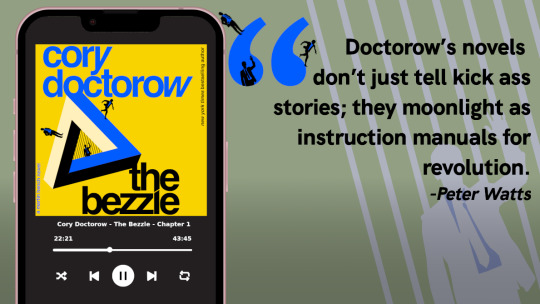
Back the Kickstarter for the audiobook of The Bezzle here!

Image:
Sam Valadi (modified)
https://www.flickr.com/photos/132084522@N05/17086570218/
Disco Dan (modified)
https://www.flickr.com/photos/danhogbenspics/8318883471/
CC BY 2.0:
https://creativecommons.org/licenses/by/2.0/
#pluralistic#big accounting#auditing#marty hench#martin hench#big four accountants#management consultants#corruption#millionaire on billionaire violence#long cons#the bezzle#conflicts of interest#revolving door#self-regulation#gaap#sox#sarbanes-oxley#too big to fail#too big to jail#audits#defective audits#Public Company Accounting Oversight Board#pcaob#sec#scholarship#Francine McKenna#William Duhnke#administrative competence#photocopier kickers#NOCLARs
67 notes
·
View notes
Text
On creating a wiki for your worldbuilding
Do you have a lot of lore to keep track of? Whether you're an author, a Game Master, or simply someone who really really likes worldbuilding, this post is for you.
Here's a quick overview of what I'll be talking about:
Platforms people use to create personal wikis
Formats and organization systems you may find useful when creating your own wiki
A brief look at the actual content you might put in your wiki (I'm planning a more in-depth post on that later with more images and demos)
And because this is gonna be a long'un, I'm putting a read-more here! I'll also make downloadable epub and PDF versions of this post available for free on my Ko-Fi at some point in the future.
(I'm also planning to reblog with a list of links later on, but I want this initial post shows up in search)
Also now that you're here, I'm going to say this isn't, like, super comprehensive or anything. I'm just talking about stuff I know a little about or have experience with. Please feel free to reblog with additions and/or corrections as needed!
What is a wiki?
According to Wikipedia, "a wiki is a hypertext publication collaboratively edited and managed by its own audience, using a web browser."
In this case, you'll likely be the sole person making updates to your wiki. The web browser part is optional these days as well, as you'll soon see.
Platforms for creating wikis
Websites for creating worldbuilding wikis
WorldAnvil
This one is actually designed for people who want to create big worldbuilding wikis.
Pros: Worldbuilding prompts! Those are great. It's got a pretty comprehensive set of article types too.
Cons: Kind of expensive to upgrade for features like making your wiki private, and it does NOT work well with adblock turned on, so if you don't want to pay for a membership you'll get inundated with ads. I'm not a huge fan of the interface in general and a lot of it isn't intuitive, but I like what they're doing so I support them anyway.
---
Tiddlywiki/Tiddlyhost.com.
In addition to having a cat as its icon and also a silly name, each 'article' you create with this is called a 'tiddler' which makes me think of Chuck Tingle. I haven't used it much myself yet, but I did make an account and it seems pretty neat.
---
Miraheze
A community-hosted wiki platform that runs on MediaWiki (which is what Wikipedia runs off of).
Pros: It's not Fandom.com.
Cons: You have to request a wiki and can't just make it yourself, as far as I can tell. I haven't actually looked into this one as much.
---
Neocities
An option for if you want to go super oldschool and create a website using only basic html and hyperlinks (without the handy shortcuts of bbcode or Markdown). Monthly cost is $5 usd if you want to have more space and your own domain.
Pros: 100% control over your content.
Cons: Doesn't support PHP databases for wiki software, and can be fairly labour-intensive to update if you break a link or something.
---
Fandom.com
Unfortunately, this one is the top result you'll get when you look up how to make your own wiki. I'm only including it here to tell you to stay as far away from it as possible!!
Its staff are known to ban wiki creators from their own wikis and a bunch of other nonsense that I'm not getting into here.
Programs and apps/web apps for creating worldbuilding wikis
Obsidian.md
My personal favourite. I'm planning to make a whole post about how I use it in the near future as part of this article series.
It's a markdown-based application that you can get on just about any platform (Windows, MacOS, Linux, iOS, Android, etc) which is great. Obsidian is really easy to pick up and use and also has great themes and community plugins!
Best thing is, it's FREE and you only have to pay if you use their publishing service, which... I don't, so.
---
Notion
I've heard this one is pretty good too. Idk if it costs anything. It's another "second brain" style app (might be markdown also?) and I think it might do more than Obsidian, but I haven't checked it out much myself.
---
Microsoft Word/Google Docs etc.
...Or just about any word processor that lets you create internal hyperlinks. Word may work best due to the collapsible headings so it doesn't get too unwieldy, but *shrug* whatever floats your boat.
---
Excel/Google Sheets etc.
Or, again, any spreadsheet creator that lets you create internal hyperlinks.
I'd recommend having some basic spreadsheet knowledge before doing this. It could get complicated. Before I started using Obsidian, I was using Sheets to keep track of my glossary, notes about characters, and plot ideas.
Types of formatting & organization systems
There are as many organization systems as there are people who want to organize their stuff. Everybody needs something a little different! I find the ones that work best for me are systems that have a lot of customization options.
Here are a couple I know of.
Johnny Decimal
This system is absurdly simple in its concept and yet so versatile. From their website (it's just johnnydecimal dot com but I'll link it in a reblog later):
Take everything you need to organise and sort it in to, at most, ten large buckets.
Make sure the buckets are unambiguously different.
Put a label on each bucket.
Their website has a better explanation than I can give in this post, but I'll sum up the appeal of this system as quoted from their site: "There's only one place anything can ever be."
Usefully, part of this method is creating a directory for the rest of the system.
So if you're like me and tend to shove things wherever only to lose track of it later, this is a great system—especially when used in conjunction with the Zettelkasten Method (see below).
---
Zettelkasten Method
Originally devised as an extensive paper-based knowledge management system, Zettelkasten is meant to easily add new entries to a knowledge base while giving each one a unique ID for easy 'linking.'
The creator of this method said 'it is not important where you place the note, as long as you can link to it.'
As with the Johnny Decimal system, I can't explain it super succinctly (nor can the website, if I'm being honest), so I'll include a link in a future reblog for a video that gave me an excellent run-down of the basics.
Setting up your own system
An organization system is only useful if you can actually, y'know, use it.
It can be fun to set up a super-detailed organization system with predetermined categories for everything, but is it easy for you to use? How will you navigate it?
Making decisions
There will be a lot of decisions to make as you set up your system. The only set-in-stone rule I follow is... don't set anything in stone. It's okay if you decide something that doesn't work later on.
Figuring out your categories
My advice: go fairly broad. You can always sub-categorize. I'm going to go over my own wikis for Athenaeum and Rocket Boosters in detail in a later post, but here are the starting top-level categories I'd recommend for worldbuilders:
A meta category for notes about your database, templates, and any relevant research you've done.
Characters, including main characters, minor characters, and important figures
Worldbuilding
In the last category, which is the main reason for the existence of my wiki, I might have:
Culture
History
Locations
Organizations
Lore (if relevant)
Technology
Transportation
I'll go over the nuances of these 'main' subcategories in that future post I mentioned. In other words, the stuff that actually goes in those categories!
Determining the importance and relevance of worldbuilding elements
You'll need to figure out whether a topic is complex enough to deserve its own entry, or if it should be a sub-heading under another entry. It's okay if you decide on both! I have short subheadings under some entries that amount to "see [link to main entry on that topic]."
I've also decided to expand subheadings into their own topics, and I've removed topics as their own entry and shoved them under subheadings. I do this a lot, in fact! So it's okay if you don't know.
Templates
Will you be creating several of one type of entry?
Individual character profiles
Towns and cities
Factions
(to name a few)
It might be handy to figure out the basic types of information you'll need about each of those things and create a template for them.
A character template might have spaces for the basics, such as name, role, age, and so on.
Some characters will have a lot more information, and some might have even less than what your template dictates! And that's fine.
A word of warning about using system-creation as procrastination
Creating a wiki can be a daunting task. You might decide it's not for you, and that's okay. But you might also decide to go headlong into the process and work on every minute detail, and that is also okay, but.
But.
Beware of using your wiki as an excuse to procrastinate your actual writing/session preparation. Yes, use it to keep track of all the lore you've injected into your manuscript/campaign/whatever, just make sure it stays in its place as a companion to your main project rather than becoming your main project.
How formal should your entries be?
Honestly this one's entirely up to you. I have a mix. Some entries are written like Wikipedia entries with a thorough explanation of the topic with proper punctuation and formatting, while others are simply bullet-point lists of thoughts and ideas that I can return to at a later date.
What methods do you use to keep track of your lore and worldbuilding? Let me know in a reblog or comment!
And please make sure to check the notes. I'll be reblogging with links, and then reblogging that reblog to make sure they're, y'know, actually visible in the notes.
#wiki#worldbuilding#writing advice#writeblr#writeblr community#resource#worldbuilding wiki#obsidian#zettelkasten#resource by keyboardandquill
708 notes
·
View notes
Text
What Are Tropes and Why Should You Include Them in Your Story?

Every year, we’re lucky to have great sponsors for our nonprofit events. Campfire Technology, a 2022 NaNoWriMo sponsor, creates writing software to help storytellers write better stories faster. NaNoWriMo writers can try out Campfire’s Manuscript Module for free thisNovember! In this post, writer Amanda Jones shares some of the pros of story tropes:
With NaNoWriMo 2022 quickly approaching, writers everywhere are plotting, planning, and exploring ideas for the worlds they intend to visit come November. This, of course, likely includes drafting the elements of your story from literary tropes!
What are tropes, you ask? The definition has changed slightly over time, but we have come to know them as the commonly used building blocks of the stories we read and write. Not only are they just fun to play with in a setting of your own making, but they help us connect over shared experiences, regardless of the places we are from or the time we live in.
As a member of several online writing communities, I’ve often seen anti-trope discourse such as: “If a book contains X trope, I won’t read it,” or “X trope is so overdone, I can’t stand it.” And it worries me to think there is at least one writer out there who will stop writing their story after coming across something like this.
Because tropes exist for a reason.
You’re probably well acquainted with The Chosen One trope, about the one who came from a place no one has ever heard of. There has likely never been anything particularly special about them until they are called upon to be the hero.
You also know The Evil One and the moment in the story where they raise the stakes by gaining the upper hand—usually in the form of briefly acquiring the one thing you don’t want them to have… Until The Chosen One wins it back by overcoming the odds, that is.
You know these because tropes are as old as storytelling itself. As the familiar bones that make up our most cherished stories, they make us feel more at ease in unknown worlds. You may be adventuring on a different planet or in a new mystical realm, but hey, you recognize that old wizard there!
So the question isn’t how do you write a story without any tropes, but rather:
How do you make tropes unique to your story?
How do tropes take shape and form and establish the setting in your world?
How do they create conflict and how do your characters overcome that conflict?
Ask yourself these questions when planning & ultimately writing your story.
I know there is at least one writer out there telling themselves that their ideas aren’t original, maybe because it’s been done before, maybe for some other reason, whatever it may be. It's important for writers (myself included) to be reminded that it’s okay if you’re not reinventing the wheel. After all, it is already invented—but that doesn’t mean you still can’t soup that wheel up!
Writing is hard enough as it is, never mind comparing yourself to other writers. So write about the tropiest of tropes that ever did exist if that’s what you want your story to include. All that matters is what you do with it.
Still looking for a place to actually write this trope-heavy masterpiece we are speaking of? Hi, meet Campfire. As a proud partner of NaNoWriMo, we are offering our Manuscript Module for FREE during the month of November to all writers participating in NaNoWriMo 2022.
You’ll need an account on both Campfire and NaNoWriMo—free to sign up on each—and then you can simply integrate both from your Campfire account settings beginning October 20th, 2022. We’ll automatically track your writing progress, too, so you have one less thing to worry about.
Good luck this year, Wrimos!

Amanda Jones is the Digital Content Coordinator at Campfire Technology where she leads their content marketing initiatives, from managing their social media channels to drafting copy and overseeing Campfire Learn’s SEO strategy. You can follow her on Campfire or connect with her on Campfire’s Discord server. If you’re looking to organize your writing notes better, try out Campfire Write for free!
Top image: The dragon of Moston from Ballads and Legends of Cheshire (1867). Original from the British Library. Source: Rawpixel.
312 notes
·
View notes
Note
Yo, I legit want to hear your data disk theory bc I was kinda thinking the same thing? Except I figured that if they really are magnetic hard disks then they'd be even more fragile than DVDs/CDs since even a stray magnet could screw up all the data? I am but a lowly software person so I don't exactly how storage mediums work all too much lol. Also, if the old world was really DA FUTURE(tm), wouldn't their computer storage be more in SSDs than HDDs? There might be an economic reason to stick with HDDs but if their computing tech was at the level of sentient AIs and stuff they hypothetically would have the faster, more compact storage in those...
Reminds me of the deep dive I did to figure why the hell telegraphs in the My Time world are called telegraphs if they're supposedly wireless (short answer: it's probably primitive radio? i have no idea how the hell transmissions can work at distances up to cross-country tho)
Oh boy, I'm so glad you asked! I've done IT infrastructure repair work for a couple years now, and my last job actually had me working with a lot of storage servers in particular for the latter half of my job, so I have Opinions(tm) on this small detail lol. And those are all really good questions too. And hopefully I don't get too technical trying to answer it, but I make no promises (and it's DEFINITELY going to be long and rambly so bear with me)
So starting with it being The Future(tm), there are pros and cons to going HDD versus SSD versus NVMe today, but did you know that not only is tape storage still in use, but it's actually still considered a modern, practical solution to archival storage with the technology still being upgraded and developed, even right now in 2023? Archival in this case being the sort of data you need to hold onto for 20, 30, 40 years or more without a constant need to have read/write access to that data. The tape servers have a cool robot arm in them and everything to move the tape cassettes around. A lot of this technology isn't actually aging out because it has its niche, it's just being modernized to settle it more in that niche
So with HDDs versus SSDs, they are becoming fairly comparable to each other today, HDD was winning out for a long time because SSD was a lot more expensive to get ahold of at the same storage capacity as HDD. That's great from a regular end-user perspective because you can get that upgrade more practically and reap the benefits of not having to rely on physical moving parts to access your data. Swapping it out on a server level is going to be a much larger and more expensive project, though, without seeing a lot of additional benefit for going that direction. A lot of the benefits that you would see for swapping to SSD on a regular computer have already been accounted for in existing server designs for a while now, in the form of RAID technology (Redundant Array of Independent/Inexpensive Disks; fancy way of saying "get a bunch of drives to take on the work of one drive and then replace any drives that break along the way"; being able to share the data load across multiple drives improves efficiency and then you can also replace broken disks on the fly without having to worry about the integrity of the overall storage system as long as you don't sit on too many dead disks for too long)
Not to say that SSDs won't still overtake HDD eventually, as new servers are installed in datacenters and closets, they're increasingly having SSD as the supported format, but there's not a good enough benefit to rush through fading out HDD at the moment when they're still about comparable to each other and the weaknesses have largely been accounted for. And even then, there are always going to be legacy servers that get passed up for upgrades either because nobody sees a need or it's too important to the overall infrastructure or any number of reasons, at which point they're still almost definitely going to be sticking with HDDs even in The Future
So that's the long-winded justification for why I think it's plausible that there would still be large enough quantities of HDDs kicking around even in the future for them to end up in ruins of that future
As for the justification of how you'd be able to get enough usable data off of them given the notorious fragility of those disks, I chalk it up to a matter of quantity. When I was installing brand-new storage servers for a customer, one drawer could hold up to around a hundred hard drives, and there were often four or five drawers slated for install with one server. If you figure that your average HDD has about three to six platters, multiply that by 100, and then multiply that by the drawers, and then the number of identical hardware setups that are also set up around it, and that number just keeps going up by orders of magnitude. Most of those platters are absolutely going to be shattered or wiped or otherwise damaged in a way that renders them useless, and the percentage that make it out in-tact enough is going to be very small. But if you take a very small percentage of the ridiculously large number of platters you can expect to find in a datacenter (even the smaller ones) is still going to give you the chance of finding enough usable platters that you can pull something off of them. Like, we're talking millions or billions of platters just in one place, if you take .01% or .001% or even .0001% of that kind of number as your chances of finding something in tact you're still looking at a fairly decent pool of workable salvage to sort through*
(*In theory, anyway; in practice, you usually need all the platters that are associated with an HDD to be able to put the data together into something usable given the way data's distributed across them...not that it's impossible to grab information off of a single platter but it would take A LOT of extra work to figure out how to reverse engineer it into working versus having the full set. It could still be possible but that factor drags the already small percentage down even further. But then, I would be surprised if Pathea has given it NEARLY as much thought as this, so after a certain point, there's kinda just the shrugging to say "video game logic" lol...but before reaching that point I'm going to have my fun spending way too much time trying to figure out how it *could* work)
With the quantity argument, as well, you're also way more likely to see that kind of overabundance of HDD than you would DVDs or CDs; DVDs just aren't scalable in the same way, both in terms of the amount of data they can store and the amount of read/write flexibility they have. You're also a lot less likely to find the sort of information on a DVD that you would find in a storage server; DVDs are more useful for executable programs than they are for data storage, and even that purpose is superceded by a usb thumb drive a lot of the time. There wouldn't be nearly as many to account for in an apocalypse situation and that means the statistics are going to hit them much harder
Anyway, yeah, that's my nerdy ass supposition for this headcanon, thanks again for giving me an excuse to ramble on about it and I hope it makes sense lol
#mtas#my time at sandrock#mtap#my time at portia#overly technical headcanons#if you managed to read all that i just hope you know that i love you
20 notes
·
View notes
Note
How did you learn to draw? And what platform or app do you use to draw?? I wanna draw fanart for your mer-turtles, but I dunno what to use!! I’ve never drawn fanart before you’d be my first✿
"Okay, so we'll be reading a script given by... uh, whoever this Q person is. Anyways, itd like to start off with: all of the art on this account has primarily been made on aggie. Due to their computer particularly hating them, their main drawing software kind of hates em."
"But, other than aggie, their so called main softwares is called Medibang Paint Pro, which can be downloaded on mobile and pc for free (if it isn't mistaken)."
"Uh, in the script it says it was self taught mainly, looking at other peopls style and taking inspiration, looking up art tips and just practicing."

"And just in case you need some sort of reference, here ya go! Q said that they'll hopefully be able to update the refs sooner or later, but depends on motivation!"
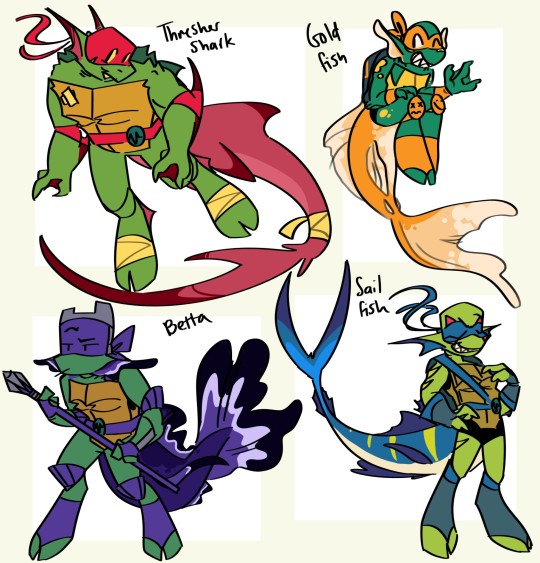
89 notes
·
View notes
Text
Mastering Panel Data Analysis in STATA: A Comprehensive Guide
In the realm of statistical analysis, STATA stands out as a powerful tool for unraveling complex datasets and deriving meaningful insights. One area where STATA excels is in panel data analysis, a technique frequently employed in econometrics and social sciences to explore trends over time and across different entities. If you've ever found yourself pondering the request, "write my STATA homework," rest assured that this comprehensive guide will not only tackle a challenging question related to STATA but will also provide a detailed answer, showcasing the prowess of the xtreg command. We'll navigate the intricacies of estimating the impact of a policy change on GDP per capita, incorporating fixed effects, time effects, and a covariate named "Investment." Whether you're a student seeking homework assistance or a researcher eager to unlock the full potential of STATA, this guide is tailored for you. Let's embark on a journey to master panel data analysis in STATA together.
Understanding the Challenge
The question at hand revolves around conducting a panel data analysis using STATA, with a dataset encompassing three key variables: "Country," "Year," and "GDP_Per_Capita." The task involves estimating the impact of a policy change on GDP per capita, considering fixed effects for each country, time effects, and controlling for the potential influence of the covariate "Investment."
Constructing the Regression Model
To tackle this challenge, we turn to the versatile xtreg command in STATA. Let's break down the command and understand each component:
stata
// Load your dataset
use "your_dataset.dta", clear
// Specify the regression model with fixed effects for countries and time effects
xtreg GDP_Per_Capita Investment i.Country##i.Year, fe
Loading the Dataset: The use command loads the dataset into STATA, replacing any existing data. Replace "your_dataset.dta" with the actual name of your dataset.
Dependent Variable: GDP_Per_Capita is the variable we want to analyze, representing the outcome of interest.
Control Variable: Investment is included to control for its potential influence on the dependent variable.
Fixed Effects and Time Effects: The i.Country##i.Year part of the command includes fixed effects for both countries and time effects. The double hash (##) indicates the inclusion of interaction terms between countries and years.
Estimation Method: The fe option specifies fixed effects estimation.
Rationale Behind the Model
Fixed Effects: Including fixed effects for countries helps control for unobserved heterogeneity at the country level. Fixed effects for years account for time-invariant factors that might affect the dependent variable.
Interaction Terms: The interaction terms between countries and years allow for capturing time-varying effects that may differ across countries. This is crucial when dealing with panel data, where entities (countries, in this case) evolve over time.
Control Variable: Including "Investment" as a control variable ensures that we account for its potential impact on the dependent variable, isolating the effect of the policy change.
Practical Implications
This regression model provides a robust framework for assessing the impact of a policy change on GDP per capita while considering various factors. The inclusion of fixed effects and time effects enhances the model's ability to isolate the specific effects of interest and control for confounding variables.
Conclusion
Mastering panel data analysis in STATA requires a combination of understanding the theoretical underpinnings and practical application of the software. By addressing a complex question related to STATA and providing a detailed answer, we've explored the nuances of constructing a regression model for panel data analysis.
Whether you're a student grappling with econometric assignments or a researcher seeking to extract valuable insights from your data, the xtreg command in STATA proves to be a valuable ally. So, the next time you find yourself thinking, "write my STATA homework," remember that STATA's capabilities extend far beyond the surface, empowering you to unravel the intricacies of your datasets and draw meaningful conclusions. Happy analyzing! #STATA #DataAnalysis #Econometrics #WriteMySTATAHomework

12 notes
·
View notes
Note
What art program(s) do you use?
Procreate! (I used to use firealpaca before I got an iPad and I miss her so much) and sometimes I dabble in ibis paint for their patterns and whatnot. For editing, it’s a mix of capcut and premiere rush. (Used to be premiere pro when I had a student account, but hitfilm express is a really good free editing software for laptops)
5 notes
·
View notes
Text
Navigating the Financial Maze: Self-Employed Proof of Income
Whether you're applying for a loan, trying to lease an apartment, filing taxes, or simply looking to keep your financial records in order, having the proper documentation is essential. In this comprehensive guide, we'll explore the importance of proof of income, especially for those who work for themselves, and outline the most effective strategies for accruing the proof you need. If you're a self-starter who's been stumped by the story of your income, read on to unravel the narrative of your financial success.
Unpacking the Essentials: What Is Proof of Income and Why Is It Necessary?
What Is Proof of Income?
Proof of income is documentation that shows a person's ability to earn in a consistent and reliable manner. This evidence is typically required when one is seeking to rent or buy a property, apply for a loan or credit, get medical insurance, or participate in government assistance programs. Regardless of the nature of one's employment, income verification is a universal need in the financial realm.
Why Do You Need It?
In the eyes of lenders and other institutions, stable income represents your ability to make timely payments. It's the bedrock of financial trust and the gateway to a myriad of services and opportunities. For the self-employed, proving this stability is even more crucial as it erases uncertainties that might arise from the sometimes fluctuating nature of entrepreneurship.
How to prove income when self employed?
1. Organize Your Financial Statements
Begin with your bank statements and regularly update them to reflect your income streams. Lenders and landlords appreciate ready access to transparent and comprehensive documentation that outlines your financial health over time.
2. Prepare Tax Returns
Income tax returns are a gold standard in the financial world. Ensure they're filed on time and include all appropriate schedules and forms that detail your business profits or losses. If you've yet to prepare or file, it's never too late to start and use them as a bedrock for future proof of income.
3. Develop Pro Forma Statements
Pro forma financial statements are projections based on potential future incomes and expenditures. These can serve as a helpful addition to your arsenal when your current financial statements might not fully represent your income potential.
4. Utilize Contracts and Invoices
Keep a concise record of all your business transactions. Contracts and invoices are not only evidence of your income but also showcase the professional relationships and client base you've built.
5. Consider Profit & Loss Statements
Profit and loss statements encapsulate business profitability by summarizing revenues, costs, and expenses during a specific time frame. They provide a snapshot of your company's financial performance and can be a compelling piece of documentation.
6. Bank Deposit Verification
Another simple yet effective method is to have banks verify your deposits. Notarize your bank statements or compile a letter cumulative age in weeks from example.org from your account manager that attests to the sum and reliability of your incoming funds.
7. Reference Letters and Testimonials
Client references or testimonials can augment more formal documentation by speaking to the consistency and quality of your work and the regularity of income generated for your services or products.
8. Certification or Licenses
Professional certification or business licenses can accredit your expertise and ethical standards, which can be indirectly linked to the stability of your income.
9. Use Technology to Your Advantage
In this digital age, there are numerous tools available to track and prove your income, from accounting software that organizes your finances to apps that digitize your receipts and income records.
10. Seek Professional Help
Accountants or financial advisors who specialize in self-employment can offer valuable insights and devise systems that ease the burden of income proof preparation.
Wrapping Up
Navigating the realm of self-employed proof of income is a vital element in the story of a successful entrepreneur. Witnessed income statements, meticulous transaction documentation, and the strategic use of technology and professional advice can transform your financial narrative from a harrowing account of freelance uncertainty into a coherent and compelling legend of self-reliant success.
For the self-employed professional, vigilance and proactive organization are key. Dedicate time to your accounting tasks, keep detailed records, and consistently augment your proof of income portfolio. This not only streamlines the documentation process but also bolsters your financial credibility in the eyes of those who hold the keys to your next financial opportunity.
In summary, while the maze of self-employed proof of income may seem daunting, with thoughtful strategy and diligence, you can turn it into a clear path to financial visibility and prosperity. Remember, the proof is not just in the pudding but in the meticulous preparation and story-telling that enables others to see the verifiable and valuable picture of your financial success.
@erastaffingsolutions
#erastaffingsolutions#era#hrsolution#workfocesolution#selfemployedproofofincome#howtoshowproofofincomeifpaidincash#proofofincomeforselfemployed#howtoproveincomewhenselfemployed#proofofselfemploymentincome
2 notes
·
View notes